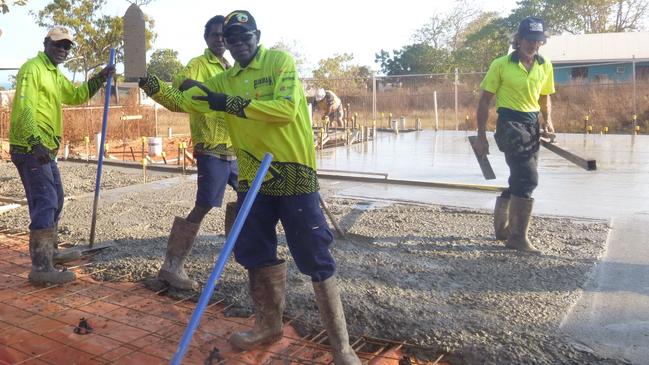The Indigenous economy is finding its economic voice

This year is a big year for first nations people, regardless of the result of the upcoming referendum.
I seek to use my words not to provide a position on the voice, and the question all citizens will have the opportunity to respond to, but rather to discuss an economic voice.
Gaala Watson, a Gungalu and Birri-Gubba woman, aptly expressed in a story that the economic relationship between the government and Indigenous peoples has historically been one of legislated dispossession.
Even up until the 1970s, legislation controlled numerous aspects of Indigenous lives, including our economic growth and freedom. This was the reality faced by my mother’s generation.
Expanding on Gaala’s perspective, it’s evident that Indigenous peoples not only experienced financial control and loss at the hands of the government but also within the business and financial markets.
This is where I find myself today. As the director of business development at First Australians Capital (FAC), the only Indigenous-led, non-government capital provider in Australia that invests in and supports Indigenous SMEs, I work to unlock more capital from the investment market for Indigenous business, and in turn unlock economic freedom. To forge a path forward it is crucial to understand our history.
Unfortunately, many of my peers rarely discuss/understand the economic history of Indigenous peoples.
While the impacts of stolen land and children are increasingly recognised, the concept of stolen wages is often overlooked. The loss of opportunities to earn a fair wage, establish businesses, and provide for our families has been traumatic.
It is not difficult to comprehend why Indigenous peoples desire economic freedom and self-determination.
If you take a moment to reflect on your own life, considering how you would provide for your family’s present and future generations, and then imagine being denied every opportunity to participate in the economy, you will begin to grasp the immense struggle and trauma Indigenous people have existed in.

I am hopeful that if you place yourself in our shoes, you will understand how the denial of a single element of our society – economic freedom – can shatter our entire world.
Our people possess remarkable resilience and entrepreneurial spirit. Despite numerous setbacks, we persist in creating a better future that benefits all generations and contributes to the wellbeing of society as a whole.
However, we operate within a financial system that was built upon our losses and is ill equipped to generate multi-generational impact for our peoples.
If you have ever applied for a job, you would understand the importance of problem-solving skills. I challenge you to think of a group of people in this country who exemplify problem-solving more than Indigenous people.
We have faced countless losses, continue to endure challenges, yet we are at the forefront of creating remarkable and impactful economic ventures.
Let us move forward, embracing the hope and opportunity that the Indigenous economy holds.
While mainstream financial institutions struggle to recognise the potential within Indigenous businesses, a thriving economy is emerging.
PwC’s Indigenous consulting group recently revealed that the economic contribution of the Indigenous business sector was on the rise.
Since 2018, the sector has grown by 47 per cent, contributing approximately $8.5bn to $12bn to Australia’s GDP in 2021.
One key reason behind this growth is the increasing number of Indigenous people starting and developing their own businesses.
It makes sense when you think about it. If you belong to a group that has had their freedoms stripped away – freedoms regarding their land, children, voice, and the opportunity to tell their own story and make decisions for themselves and their families – entrepreneurship becomes a means to reclaim that lost freedom.
Indigenous entrepreneurship in Australia is evolving, just like any growing market. However, for it to truly thrive, appropriate and timely access to capital is essential.
Through my work at FAC, I have had the privilege of supporting businesses across various sectors – from Maara Collective in fashion, Yaala Sparkling with their native botanical products, construction firms like Aboriginal Sustainable Homes, and Wiru Drones, a drone pilot company.
Like all small businesses, they share a common need: access to capital for growth.
Working at FAC has been the highlight of my career, as someone with entrepreneurship in their blood and bones.
Being able to provide businesses with the necessary debt finance to catalyse their growth fills me with a profound sense of gratitude. While there are encouraging developments and impactful progress, we need more.
The efforts made by Indigenous people cannot be sustained if capital flows from mainstream finance, impacts investment, private equity, venture capital, and superannuation do not open up.
The opportunity for our country to support the Indigenous economy in a way that promotes reciprocity, humility, and self-determination is both tangible and sustainable.
Our people have demonstrated time and again that we possess the skills, determination, willpower, and knowledge to run thriving enterprises.
What we need is for the economy to embrace us, allowing us to lead in the industries that are rooted in our knowledge and land, and supporting the growth of our economy.
By nurturing Indigenous entrepreneurship, not only do communities flourish, but we also witness improvements in health and education outcomes, bringing us closer to becoming a reconciled nation.
Tiarne Shutt is the director of business development at First Australians Capital.




I write this from my own Worimi perspective, and as the daughter of small business owners I want to acknowledge that I cannot encompass the diverse views of First Nations people across the continent. The strength of Aboriginal peoples lies in our cultural diversity and diversity of thought. I honour our wise elders and ancestors who have shaped us with the knowledge, courage, and tools to preserve and share our culture, while striving for a future that is abundant in freedom for generations to come.